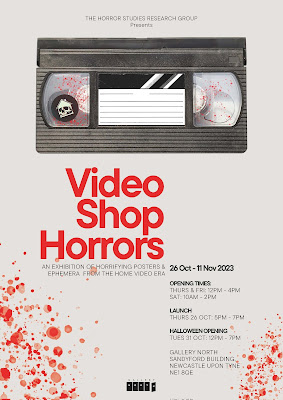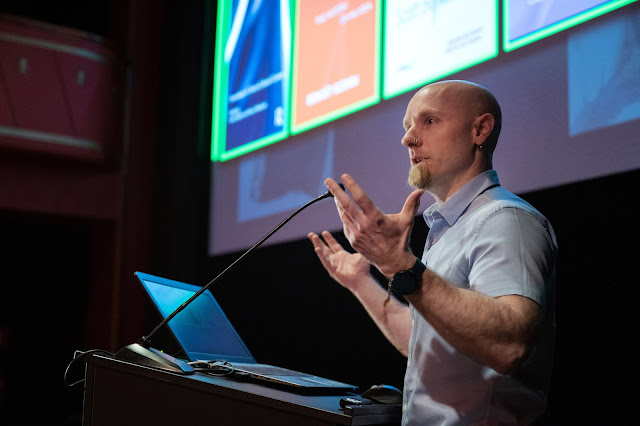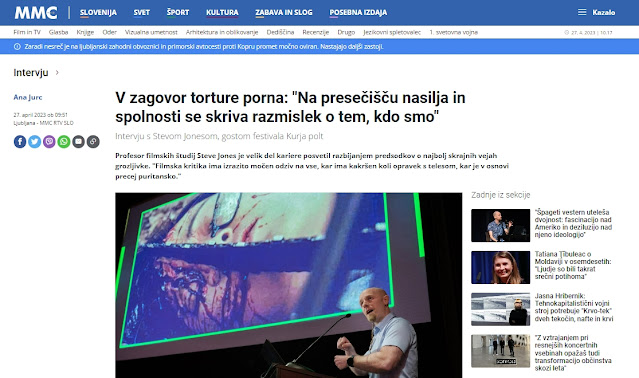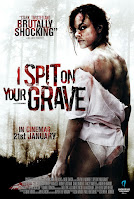Monday, 27 May 2024
Profile video
Friday, 9 February 2024
Video Shop Horrors Exhibition
"Video Shop Horrors" was a multimedia exhibition held at Northumbria University's Gallery North, 26th October to 11th November 2023.
"Video Shop Horrors" captured the nascent video shop experience. In the 1980s, horror videos always seemed to be more effectively promoted than those of other genres. The artwork tended to be bombastic, awash with contorted faces, flashing blades, ghouls and gore.
The so-called ‘video nasties’ moral panic came and went, but its legacy, the types of film it encompassed, and the promotional strategies of the first video distribution companies, live on. This exhibition captured the dynamism of this hugely significant technological moment, pooling from original archival materials, to showcase the promotional strategies employed by video companies to attract consumers and, in some cases, to whip up controversy. The significance of video to the development and enduring popularity of horror films cannot be understated.
"Video Shop Horrors" recreated the 1980s/90s video shop experience whilst celebrating the aesthetic and the wealth of films that helped define and redefine the horror film genre.
The "Video Shop Horrors" exhibition was led by Dr Johnny Walker drawing on his extensive archive of video-related paraphernalia. The exhibition featured video and music by Dr Steve Jones. The exhibition represents the interests of staff working within the University’s new Horror Studies Research Group.
Below are some videos documenting the exhibition:
An interview with me and Johnny about the exhibition:
The soundtrack I composed for the exhibition:
Horror Studies Research Group at Northumbria
We've been busy since we launched in October 2023. Aside from running our reading group, I set up our website, Twitter/X feed, and YouTube channel. The YouTube channel features playlists of various talks, podcasts and events our members have been involved in.
We organised a multimedia exhibition - "Video Shop Horrors" - at Northumbria University's Gallery North, 26th October to 11th November 2023. Read more about that here.
We hosted a workshop for the AHRC funded Youth and Horror Network, organised by Kate Egan (Northumbria Univeristy) and Cat Lester (Birmingham University) on 7th November.
We also won funding to host our annual Horror Studies Now conference: more details and the Call for Papers is available here.
There are lots of developments to follow, but if you want to get in touch, contact us at horrorstudies@northumbria.ac.uk
The Metamodern Slasher Film - New Book Out Now!
My new book, The Metamodern Slasher Film is finally out!
To find out more, click here: Metamodern Slasher Film | Dr Steve Jones
If you order through Edinburgh University Press, use the code NEW30 to get 30% off
Here is a video presentation about the book's content: https://www.youtube.com/watch?v=y9L3Fn6U0P4
Thursday, 27 April 2023
Talk and interviews at Kurja Polt Film Festival
I recently attended Kurja Polt Film festival (Slovenia) to give a talk based on my forthcoming book The Metamodern Slasher Film (which should hopefully be out with Edinburgh University Press later this year).
My talk was titled "Subtraction and Compression in Contemporary Indie Horror" (or, as Google translate put it, "Countdown and The Thickening"). The abstract is available here. A recording of the talk is available below
While I was there, I was interviewed for RTV's Osmi Dan and for the radio programme Gremo v Kino. I was also interviewed by Ana Jurc for MMC about my broader research profile.
It was fantastic to be back in Ljubljana, to be speaking alongside Alexia Kannas again, and to meet the other guests at this year's festival
Friday, 1 April 2022
Metamodern Slashers - Video and Article
Two updates to my ongoing research project on Metamodern Slasher films:
First, the video of my keynote at last year's Slasher Studies conference has been uploaded to YouTube: it is available here https://www.youtube.com/watch?v=bJZ8bjphP_A
Second, the first article from the project has just been published in Slovenian language in Kino. Here is a link to the abstract: https://e-kino.si/clanki/od-postmodernega-k-metamodernemu-slasherju/
Wednesday, 2 March 2022
New Article on Revenge and I Spit on Your Grave (2010)
Abstract
Despite being a prevalent theme in popular cinema, revenge has received little dedicated attention within film studies. The majority of research concerning the concept of revenge is located within moral philosophy, but that body of literature has been overlooked by film studies scholars. Philosophers routinely draw on filmic examples to illustrate their discussions of revenge, but those interpretations are commonly hindered by their authors’ inexperience with film studies’ analytical methods. This article seeks to bridge those gaps. The 2010 remake of I Spit on Your Grave is used as a case study to illustrate the benefits of an interdisciplinary engagement with revenge. Philosophical literature on the topic has routinely posited that revenge is either appealing or appalling, and that impasse has stifled conceptual understanding. The interdisciplinary approach employed here elucidates that revenge is simultaneously appealing and appalling; this dualistic nature is evident in I Spit on Your Grave since it is built into the narrative design. I conclude that an interdisciplinary approach to revenge has the potential to advance understanding of revenge-qua-concept both within films studies and philosophy.









